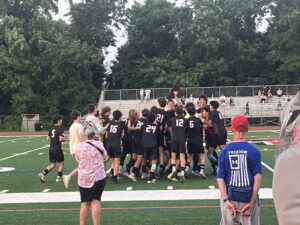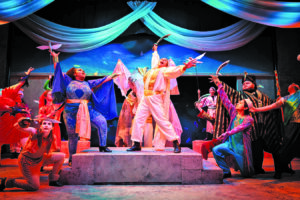
As their deliberations on the item did not even begin until well after 10 p.m. Monday night and quickly went to some critical issues and unanswered questions, the Falls Church City Council voted 6-1 to defer approving an action to move a second more detailed “request for proposal” to the two prospective developers of the City-owned 36 acres of land adjacent the West Falls Church Metro station. Since most of the deliberations on the subject have been held behind closed doors, due to alleged confidentiality considerations, the public and even the Council has had almost no details on the plans as they’ve been developed to move forward. Council members complained Monday that they’d had “less than one business day” to assess this latest proposal, for example.
Meanwhile, the joint, mostly-confidential deliberations between the City Council and School Board have produced an unimaginative, bare-bones concept for a $112 million high school construction/middle school expansion project, with no amenities such as a swimming pool, and development on 11 acres allowed for commercial use of a mix of a minimum of 40 percent commercial and 60 percent residential use, and that’s it.
Ideas of phasing in a more modular approach to building the high school, such as Council member Letty Hardi introduced tonight, had no place in the plan, and when Council member Marybeth Connelly noted that the 40-60 ratio of commercial to residential on the economic development portion of the land would be by far the highest in the City, as the market has consistently rejected such levels, there was no answer.
The time-line for the plan presented tonight pushed a public referendum from this November to May 2017. Yet with Monday night’s deferral until after the Fiscal Year 2017 budget is expected to be approved (on April 25), it was suggested that the item be removed from this year’s Capital Improvement Projects (CIP) line item in the budget and pushed ahead.
School Board chair Justin Castillo complained about the “constraints” on the site impacting the decision to rule out a pool, but City Councilman Phil Duncan said that immediate constraints should be measured against the benefits of 65 years of productive use, There was also no mention of the possible revenue generating potentials of an olympic-sized pool.
Hardi said she was concerned that this project could win the approval of voters in a referendum and suggested a “smaller price tag for the school.” She said, “This is the most strategic piece of land in the City and we want to make sure we don’t miss out on this opportunity.”
City Councilman David Snyder also suggested “we need to see something more imaginative,” and Councilman Dan Sze concurred, saying, “What can we do, a modular approach, a larger high school, 40 percent non-residential, an ice rink surrounded by a medical research center? This is a generational project” that, he complained, has been “one day business day in the public and we’re being asked to approve after 11 p.m. tonight.”
Sze’s references were perhaps a not too subtle reference to the Reston Town Center as a model for development of the site.
The second-stage draft RFP includes the option for a developer to either purchase or acquire the economic development portion of the land through a long-term lease. Either way, the stipulation is that 25 percent or more of the purchase or lease price be provided by the developer up front, and that portion would be used to mitigate the cost of the construction of a new high school for the first few years before revenues from the economic development kick in to contribute.
In other actions of the Council Monday night:
By a vote of 6-1 (Hardi voting no), the Council approved expenditures of up to $1.2 million for the first phase of a $17.4 million renovation and expansion of City Hall. The Council was informed that it could halt the process at any point it deemed the plan was not in accord with its wishes, beginning at the point $224,000 is expended for a first schematic design component. Numerous City Hall employees testified during the public hearing of the deteriorated and unsecured conditions of the 60-year old building with its 10 points of entry, including members of the seven-member Employee Advisory Council and the police department.
By unanimous votes the Council adopted the plans for the development of the W&OD Trail through the City and the concept small area plan for the six blocks of West Broad outlined in earlier Council discussions. Principal Planner Paul Stoddard, in response to inquiries, stated that the criteria in the plan for assembled lot sizes and floor-to-area ratios are merely guidelines for the area, overall, and are not meant to be interpreted as specific for particular lots. He also said that the projected potential annual tax yield from commercial development on the strip of upwards of $14 million referred to land not already either developed or approved for development, but as yet considered parcels.
The Council discussion of the Fiscal Year 2017 budget, which it is due to adopt on April 25, went to whether or not a goal of no real estate tax rate increase should be its goal, or whether the two cent increase recommended by City Manager Wyatt Shields should be adopted. Mayor David Tarter was among those who spoke of no tax rate increase, but Council member Karen Oliver questioned whether such a short-term goal for this year would not harm the City’s longer range fiscal sustainability. Councilman Phil Duncan questioned the amount of fund tied up in the City’s fund balance, which is slated to be maintained at the top end of its range of 12-to-17 percent of the annual operating budget and data concerning projected school enrollment growth. The discussion also centered on whether the City should accept the $550,000 grant from its Economic Development Authority to construct a small pocket park on City-owned land in the 100 block of West Broad.
At the beginning of Monday’s meeting, the Council honored Police Officer Missy Elliott as the City Employee of the Year for her work with health and wellness programs for the police department and the court system. She has been an employee of the City for almost 20 years. It was noted that others also nominated for the honor included 30-year veteran employee of the Public Works Department Joe Dowling and Principal Planner Stoddard.
CORRECTION: An earlier version of this report stated that the concept for a new high school in Falls Church would cost $122 million.













